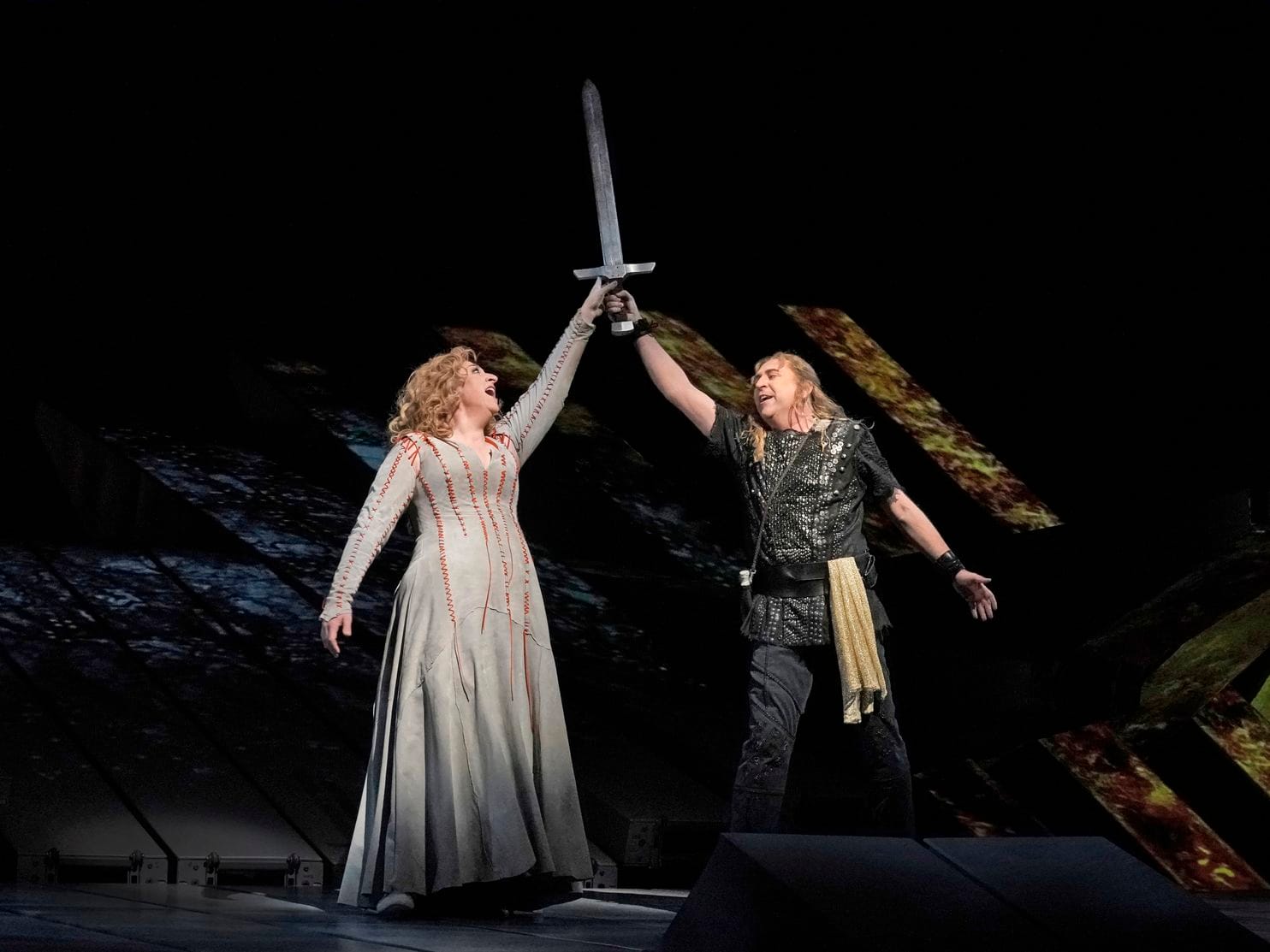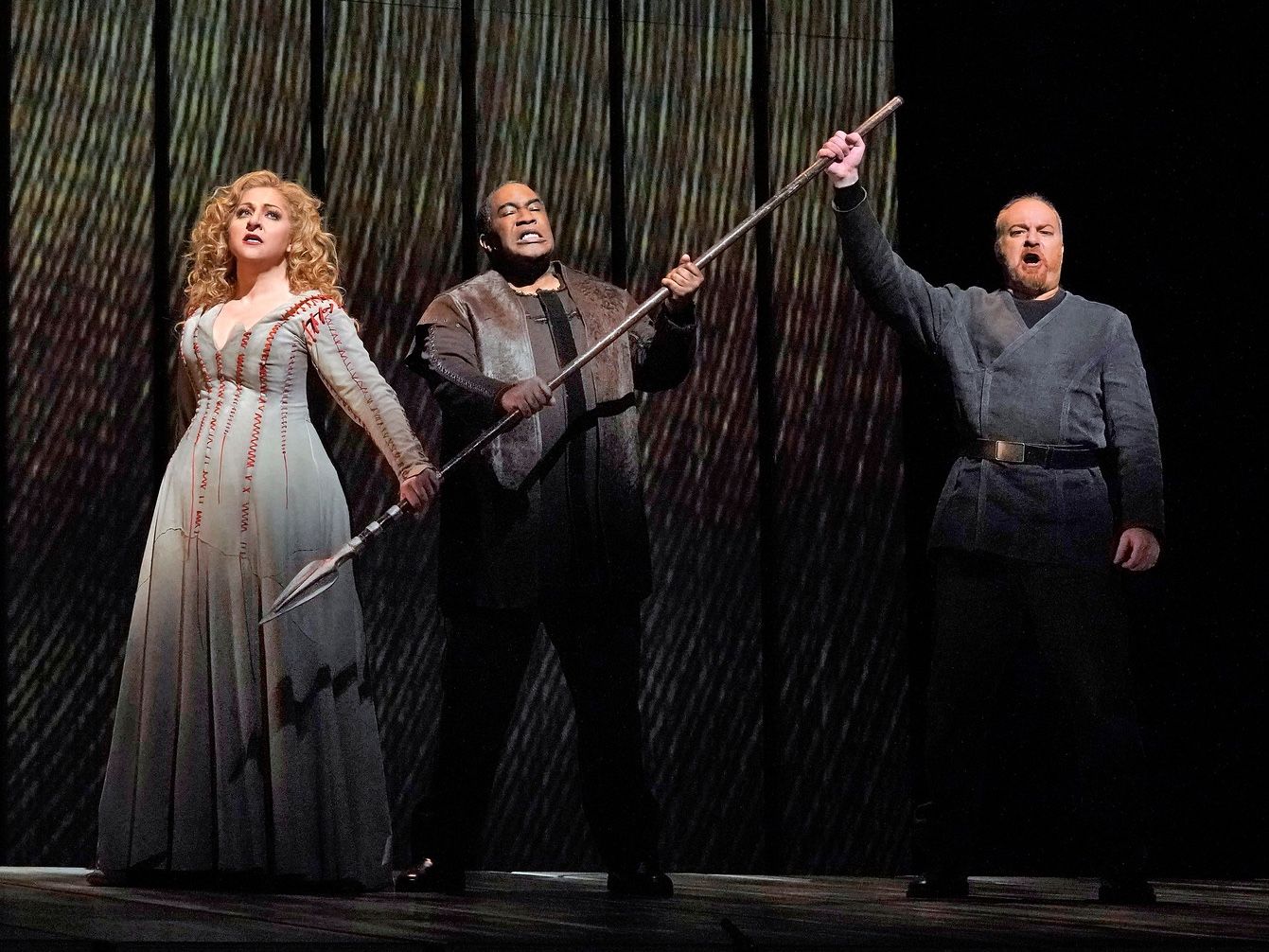VIEWPOINTS – Robert Lepage’s controversial Ring Cycle at the Met concludes with a brilliantly performed SIEGFRIED & GÖTTERDÄMMERUNG
- By drediman
- May 11, 2019
- No Comments

Christine Goerke and Andreas Schager in Richard Wagner’s “Siegfried” at the Metropolitan Opera. Photo by Ken Howard.
Tonight marks the closing of the Metropolitan Opera’s 2018-2019 season, which concludes with the final performance of Götterdämmerung, the cataclysmic final opera of Richard Wagner’s epic Ring Cycle. Over the last month or so, the Met has staged three full cycles of its controversial Ring, which has been directed by French Canadian auteur director Robert Lepage. I recently completed my second complete Lepage Ring Cycle — having initially seen the productions when they were new a few years ago — by recently paying a visit to Siegfried and Götterdämmerung. Having had a number of years to digest that whole spectacle (onstage and off), it’s nice to have the opportunity to revisit the retooled staging with fresh eyes and without all the offstage distractions.
In terms of the productions themselves, I concede that they’re hit-or-miss. But the overarching conceit of Mr. Lepage’s vision is truly noteworthy, and it’s been executed – for the most part – with breathtaking technical ingenuity, especially this second time around. Yes, there are moments of blandness and awkwardness that creep in, but the idea of having the visual component of the operas flow so directly and organically from Wagner’s monumental musical tapestry (through an ever-dancing “Machine” and flowing projections) to unify the mammoth story – which is told through four operas (collectively nearly 20 hours in the opera house!) – is an experiment well worth undertaking.

Christine Goerke, Eric Owens, and Evgeny Nikitin in Richard Wagner’s “Götterdämmerung” at the Metropolitan Opera. Photo by Ken Howard.
Now on to the performances. I would argue that the casts of this season’s Siegfried and Götterdämmerung exceeded those of the first two operas, Das Rheingold and Die Walküre, which I saw a few weeks ago. Notable were the two planned casting changes – Michael Volle as Wotan (or the “Wanderer”) in Siegfried, taking over from Greer Grimsley from the previous installments; and two Siegrieds, Stefan Vinke in Siegfried and Andreas Schager in Götterdämmerung. All three were quite superb. Mr. Volle’s Wotan possessed everything that unfortunately eluded Mr. Grimsley – a magnetic stage presence, innate dramatic sense, and a gorgeously-toned bass-baritone to match. Siegfried is notorious for being one of the most challenging tenor roles in the operatic canon, and both Mr. Vinke and Mr. Schager rose the challenge, triumphing in the role with vigorous characterizations and heroic vocals. Additionally, bass-baritone Eric Owens, whose voice hasn’t sounded this robust in years, portrayed the villainous Hagen with compelling intensity. Returning magnificently to their roles were Chrisinte Goerke as Brünnhilde and Tomasz Konieczny as Alberich, both in excellent voice, as before. Ms. Goerke, in particular, deserves many accolades for convincingly developing her character over the course of three of the meatiest works in all of opera.
The Met Orchestra, under the baton of maestro Philippe Jordan, continued to play brilliantly, with just the right balance between urgent storytelling and musical transparency, allowing listeners to fully bask in the glories of Wagner’s singular achievement. And the Met Chorus – for the first time utilized in Götterdämmerung– sounded resplendent in a welcome shift in musical palette.
RECOMMENDED
RING CYCLE: SIEGFRIED & GÖTTERDÄMMERUNG
Opera
The Metropolitan Opera
Both Siegfried and Götterdämmerung run approximately 5 hours, 30 minutes (with two intermissions)
In repertory through tonight

 Copyright © 2025
Copyright © 2025
Leave a Reply